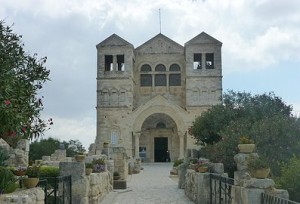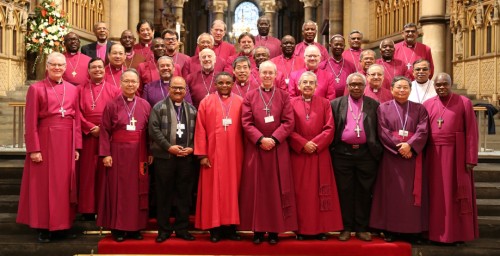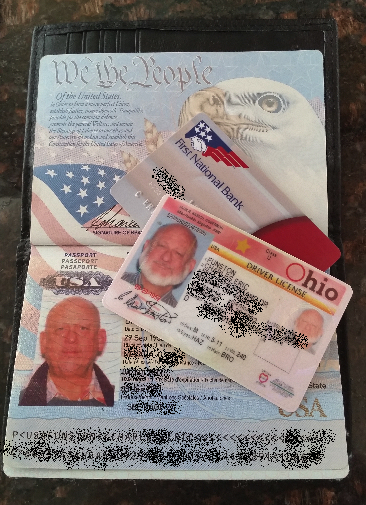====================
A sermon offered on the Last Sunday after the Epiphany, February 7, 2016, to the people of St. Paul’s Episcopal Church, Medina, Ohio, where Fr. Funston is rector.
(The lessons for the day are Exodus 34:29-35, Psalm 99, 2 Corinthians 3:12-4:2, and St. Luke 9:28-43a. These lessons may be found at The Lectionary Page.)
====================
 As many of you know, Evie and I were privileged to make a pilgrimage to the holy places of Palestine summer before last and one of the sites we visited was Mt. Tabor, the traditional “Holy Mountain” on which the Transfiguration is believed to have taken place.
As many of you know, Evie and I were privileged to make a pilgrimage to the holy places of Palestine summer before last and one of the sites we visited was Mt. Tabor, the traditional “Holy Mountain” on which the Transfiguration is believed to have taken place.
Mt. Tabor is quite tall and quite steep. It is what’s called an inselberg or isolated “island mountain” rising nearly 2,000 feet above the Kfar Tavor plain which it dominates. To get to the top, you have to get out of your large tour coach and board smaller (and quite dilapidated) eight-passenger mini-vans piloted by maniacal Bedouins who drive you at break-neck speeds up a road with several sharp switch-back turns to the Franciscan monastery and church at the summit. (Making that ascent “transfigured” Jesus in my mind’s eye from the rather scrawny figure we often see on crucifixes into a very fit, muscular mountaineer! He and his disciples must have been in really good shape to make that climb!)
The Church of the Transfiguration is one of several in the Holy Land built for the Franciscans by the early 20th Century architect Antonio Barluzzi, who accomplished there what Peter sought to do in the story we heard from Luke’s gospel. As one comes to the entrance of the church, before actually entering the main church, one finds to one’s left a separate chapel dedicated to Moses, and to one’s right, a chapel dedicated to Elijah. There is no direct communication between the chapels and the main church. As much as I admire the architecture of Barluzzi, and think some of his churches in Palestine are wonderful, I think he got this one wrong, because I have come to believe that communication is what the Transfiguration is all about. Before I get to that, however, I need to talk about time and eternity, for they form the backdrop of the communication in question.
I have, a few times in the past several months, shared with you the poetry of an English priest named Malcolm Guite, and want to do so again this morning. This is his sonnet entitled Transfiguration:
For that one moment, ‘in and out of time’,
On that one mountain where all moments meet,
The daily veil that covers the sublime
In darkling glass fell dazzled at his feet.
There were no angels full of eyes and wings
Just living glory full of truth and grace.
The Love that dances at the heart of things
Shone out upon us from a human face
And to that light the light in us leaped up,
We felt it quicken somewhere deep within,
A sudden blaze of long-extinguished hope
Trembled and tingled through the tender skin.
Nor can this this blackened sky, this darkened scar
Eclipse that glimpse of how things really are.
(Transfiguration: a glimpse of light before Lent)
I love Guite’s first two lines: “For that one moment, ‘in and out of time,’ on that one mountain where all moments meet . . . .”
In the ancient Greek language and in the Greek of the New Testament, there are two words both translated into English as “time.” The first is chronos; this is measurable time with, as one writer has put it, “the future passing through the present and so becoming the past.” This word is the root of such English words as chronic, chronicle, and chronology. Chronos is characterized by the itemized, studied measurement of time. The word is used 54 times in the New Testament. When Luke, for example, uses it, it is in the context of measurable time, as when he says a traveler went away for a “long time” (Lk 20:9). Interestingly, when Satan tempts Jesus with all the kingdoms of the world “in a moment of time,” it is this measurable form of time that Luke names (Lk 4:5).
Perhaps picking up on Luke’s implication, Fr. Patrick Reardon, an Orthodox pastor and theologian, has said of chronos:
Because it is made up of some things that don’t exist anymore [the past] and other things that don’t yet exist [the future], [chronos] is a true image of non-existence, a veritable icon of death. In fact, only dead time can be measured. Moreover, chronos is, in this respect, rather ghoulish. Even dead, it continues to feed on us. We may speak of “killing time,” but it invariably ends up killing us. Chronos is, therefore, an image of everlasting death, what the Bible calls the “bottomless pit,” or hell. What is hell but the reign of death in ongoing, unending sequence? (Orthodoxy Today)
The alternative to measurable time, chronos, is kairos, a word used 81 times in the New Testament, almost always to refer to “the proper time,” to signify a chosen moment as when, in Luke’s gospel, the angel of the annunciation tells Zechariah, father of John the Baptist, that events will be “fulfilled in their proper time.” (Lk 1:20) Kairos is “time as a moment, time as occasion, time as qualitative rather than quantitative, time as significant rather than dimensional.” (Reardon) Kairos is always a “now.” Says Fr. Reardon:
Kairos, because it is present, is an icon of eternal life. To experience the now, after all, one must be alive. The dead know nothing of now. Therefore, the now, the kairos, is an icon of the life of heaven. Indeed, eternal life is an everlasting now, in which there is no sequence, no before and after.
It is to kairos, to eternity, that Guite refers, I believe, when he describes the Transfiguration taking place in “one moment, ‘in and out of time,’ on that one mountain where all moments meet.”
In the Transfiguration, eternity irrupts into time. The Lutheran Greek scholar Rob Myallis reminds us that the Greek for “brilliant” “has tucked within it the word ‘astra’ [as in] ‘astronomy.’ Jesus is bright like the stars. Interestingly, the only other place this word appears in the whole Bible is [in the Greek Septuagint translations of] Ezekial and Daniel, perhaps a reminder that transfiguration has an eschatological bent – it is the future breaking in and not simply the past catching up!” (Lectionary Greek)
What Peter and James and John saw on that mountain top, what we are privileged to see with them through the evangelists’ reports, is a vision of the climax of history, of the end of chronos time, and in its place a vision of the eternal now of kairos. Eternity, longed for by prophets, seers, and visionaries, is realized in the Transfiguration of Jesus. Heaven and earth meet in the Transfiguration; past, present, and future meet without dissolving the distinction between them.
Baptist theologian Alan Culpepper in his commentary on Luke in The New Interpreter’s Bible says, “The transfiguration is like a composite of the whole Gospel tradition. In one scene we hear echoes of the baptism of Jesus, Jesus’ passion predictions, Jesus’ fulfillment of the Law and prophets, the death and resurrection of Jesus, and his ascension and future coming.” (Vol. IX, p 207) From his birth and baptism to his ascension and his expected return, Jesus’ Incarnation is summed up in the Transfiguration which allowed his disciples, and allows us, to see him clearly.
The pieces all fall into place in this remarkable moment of kairos when the past, present, and future meet. In that moment, eternity irrupts into time, kairos overwhelms chronos, and past, present, and future are crystal clear. Little wonder the disciples are bedazzled by star-bright brilliance!
And what happens in this moment of eternity is a conversation. Luke, adding to the stories of Matthew and Mark who also report the Transfiguration, is very careful to tell us that this event took place in the context of prayer. In the very first sentence of his tale he says, “Jesus took with him Peter and John and James, and went up on the mountain to pray.” Prayer, as we all know, is conversation with God. St. Ignatius Loyola, founder of the Society of Jesus, often used the Spanish word conversar to describe prayer. Conversar means “to converse,” “to talk with.” Its simplest meaning in English is sincere talk between persons, the kind of comfortable, satisfying conversation in which we truly get to know the other person. It is in this conversational context that the Transfiguration takes place.
It is exemplified by the appearance of Moses and Elijah with whom Jesus discusses his departure. It is often said that they represent the Law and the prophets and their fulfillment in Jesus. Jewish New Testament scholar Amy-Jill Levine, however, suggests otherwise. In her footnotes to Luke in The Jewish Annotated New Testament, she says this is unlikely, that instead they probably represent the elect, all the righteous people of God. (p. 120) They are human beings in intimate conversation with God Incarnate in Jesus the Christ.
How often do we imagine prayer to be nothing more than us talking to God? We who are formed in the Anglican tradition of “common prayer,” of saying together words from a book, often fall into this trap. I know a lot of Episcopal clergy who freeze up when asked to pray in public without a Prayer Book close at hand: “I don’t know how to pray extemporaneously; I don’t know the words to say,” they will explain in moments of candor. But if our prayer is truly to be the kind of comfortable, satisfying conversation in which we truly get to know the one with whom we are conversing, then our prayer should be at least as much listening as it is speaking. If God were to say nine words to us, what would they be? I suspect they would be the same ones said to Peter and James and John, “This is my Son, my Chosen; listen to him!”
We cannot all have experiences like the Transfiguration in our prayer lives, nor should we expect to do so. But the Transfiguration challenges us to seek something higher in prayer than speaking mere words in the hope that God might possibly somehow listen to us. Our daily prayer should include not so much talking and more listening, more communicating in hopes of hearing, of sensing, of knowing the powerful presence of God in our lives.
And that is where Peter got it wrong when he blurted out, not knowing what he was saying, “Let us make three dwellings, one for you, one for Moses, and one for Elijah.” That is where Antonio Barluzzi, brilliant architect that he was, got it wrong when he realized Peter’s ambition and built those chapels, separate and apart and not communicating with the nave of the Church of the Transfiguration. If the Transfiguration teaches anything, it is that dramatic experiences of Christ’s glory, glimpses of eternity, instances of kairos come in the dynamic reality of communication. Experiences of the glory of God are only possible if lived together, in community. Nobody, not even Jesus, could shine alone! The Transfiguration shows that it is only when we are together that God’s radiance can light ours and others lives. It is only in the intimacy of holy conversation with God and with one another that we find that “one moment, ‘in and out of time’,” that place “where all moments meet,” where we get “that glimpse of how things really are.”
Amen.
====================
A request to my readers: I’m trying to build the readership of this blog and I’d very much appreciate your help in doing so. If you find something here that is of value, please share it with others. If you are on Facebook, “like” the posts on your page so others can see them. If you are following me on Twitter, please “retweet” the notices of these meditations. If you have a blog of your own, please include mine in your links (a favor I will gladly reciprocate). Many thanks!
====================
Father Funston is the rector of St. Paul’s Episcopal Church, Medina, Ohio.

 We’ve heard this Gospel story before. We all know what happens (at least in the Synoptic Gospels) after Jesus is baptized: a voice is heard from heaven, “You are my Son, the Beloved; with you I am well pleased” (Lk 3:22) and then Jesus goes into the desert for forty days of retreat where he grapples with temptations.
We’ve heard this Gospel story before. We all know what happens (at least in the Synoptic Gospels) after Jesus is baptized: a voice is heard from heaven, “You are my Son, the Beloved; with you I am well pleased” (Lk 3:22) and then Jesus goes into the desert for forty days of retreat where he grapples with temptations. 
 Languages and the study of languages fascinate me – if you didn’t know that before this series on the Lord’s Prayer, you probably know it now – and I am therefore always keenly aware of the difficulty of fully appreciating the Holy Scripture if we only consider the meaning of the English translation.
Languages and the study of languages fascinate me – if you didn’t know that before this series on the Lord’s Prayer, you probably know it now – and I am therefore always keenly aware of the difficulty of fully appreciating the Holy Scripture if we only consider the meaning of the English translation.  John the Baptizer came, Luke tells us, “proclaiming a baptism of repentance for the forgiveness of sins.” (Lk. 3:3) In today’s Gospel lesson, John tells the crowds who came to him, “Bear fruits worthy of repentance.” (v. 8) Our catechism teaches us that repentance is required of us to receive the Sacraments. With regard to baptism, the catechetical requirement is that we “renounce Satan, repent of our sins, and accept Jesus as our Lord and Savior;” with regard to the Holy Eucharist, that we “examine our lives, repent of our sins, and be in love and charity with all people.” (BCP 858, 860) But John’s admonition and the Catechism’s requirements leave us wondering, “What exactly is ‘repentance’?”
John the Baptizer came, Luke tells us, “proclaiming a baptism of repentance for the forgiveness of sins.” (Lk. 3:3) In today’s Gospel lesson, John tells the crowds who came to him, “Bear fruits worthy of repentance.” (v. 8) Our catechism teaches us that repentance is required of us to receive the Sacraments. With regard to baptism, the catechetical requirement is that we “renounce Satan, repent of our sins, and accept Jesus as our Lord and Savior;” with regard to the Holy Eucharist, that we “examine our lives, repent of our sins, and be in love and charity with all people.” (BCP 858, 860) But John’s admonition and the Catechism’s requirements leave us wondering, “What exactly is ‘repentance’?”  It’s the Second Sunday of Advent so according to our lectionary tradition, we hear the words of John the Baptizer, the voice of one crying in the desert, calling us to clean up the roadways and build a straight path for God’s coming. We are all familiar with the Baptizer. He’s some sort of cousin of Jesus. He’s a bit of a wild man; he lives in the wilderness wearing rough clothing and eating only what foods he can pick from desert plants and animals, “locusts and wild honey” is the way the evangelists put it. This year we hear Luke’s version of John’s story.
It’s the Second Sunday of Advent so according to our lectionary tradition, we hear the words of John the Baptizer, the voice of one crying in the desert, calling us to clean up the roadways and build a straight path for God’s coming. We are all familiar with the Baptizer. He’s some sort of cousin of Jesus. He’s a bit of a wild man; he lives in the wilderness wearing rough clothing and eating only what foods he can pick from desert plants and animals, “locusts and wild honey” is the way the evangelists put it. This year we hear Luke’s version of John’s story. Perhaps you’ve heard about the recent advertisement that the Church of England wants to run in cinemas in the United Kingdom. It’s part of a campaign which includes the Church’s new website called
Perhaps you’ve heard about the recent advertisement that the Church of England wants to run in cinemas in the United Kingdom. It’s part of a campaign which includes the Church’s new website called 

